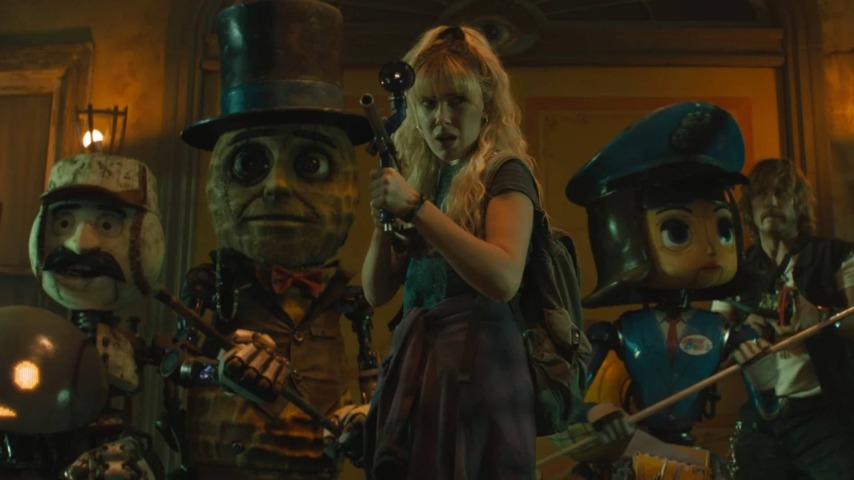Dystopian fiction has always been a place for audiences to embed themselves in times of political unrest. It can be a relief to see one’s era-specific nightmare play out in grueling, visceral detail while still being alive, curled up on the sofa, after the boot has dropped and the dust has settled. There are countless things to keep a person up these days, pondering the collective fate of society, but filmmakers Joe and Anthony Russo concern themselves with machines and the possibility of robotic intelligence in their newest terrible cinematic streaming venture: Netflix’s The Electric State.
The film follows Michelle (Millie Bobby Brown, who Netflix seems to have trapped in one of those decades-long contracts à la MGM stars of the 1930s) after she loses her family in a car crash, and must survive alone in a world dominated by VR headsets and their corresponding robot interfaces. When her younger brother Christopher (Woody Norman) appears in the form of a robot spitting cartoon catchphrases, she realizes that he’s actually alive, and sets out to save him from a maniacal tech mastermind, Ethan Skate (Stanley Tucci, who seems like he doesn’t have any idea what is happening in this movie). Along the way she meets contraband smuggler Keats (Chris Pratt) and a variety of wisecracking robots. CGI hijinks ensue.
Despite the bizarre plot, The Electric State does feel somewhat prescient. After all, AI is a hotbed for existential dread right now, with people endlessly litigating its ethics and its legality. Increasingly accessible versions of this tech (like ChatGPT) have prompted deeper questions about who we are in an age of technological advancement. What happens when machines can approximate people’s jobs? What happens when people are rendered functionally obsolete? What makes humanity unique, or even intrinsically valuable? It’s not ridiculous to imagine a dystopian adventure that imagines where this next, horrible chapter of human life could take us. What the Russo brothers manage however, is to construct a story about such an idea that refuses to even gesture towards the aforementioned questions.
Almost every artistic decision in The Electric State prompts incredulity. Why is this set in the ‘90s, beyond needing the ability to drop a cover of “Wonderwall” in the closing moments? How is the worldwide VR network powered by a teenage boy’s brain? Why is Woody Harrelson playing Mr. Peanut? (Really!) At its best, adventure stories prompt curiosity, stretching beyond the narrative on the screen and suggesting more. In today’s oversaturated franchise landscape, it’s hard to remember how the first Star Wars was marked by an inspiring sense of potential. Every set was fitted with infrastructure that felt fully functional, indicative of being a small part of something much greater. By comparison, every sequence of The Electric State is a blank notecard on a wall, unmoored from any internal logic. The film inspires questions regarding the world, but not the right kind of questions.
One of the more frustrating aspects of The Electric State is Michelle’s thinly drawn characterization and lackluster motivations. Despite explaining that her family died in a car crash, she harbors a unique, inexplicable resentment towards technology, one that is frustratingly removed from the 10 minutes of exhaustive backstory spelled out in a sludgy, gray montage. There was a seemingly brutal war between man and machine…but it never touched Michelle directly. What would have been a simple and effective motivation ends up hanging limply as a loose plot thread. Brown must play someone who is ostensibly the kind of “badass heroine” that Hollywood is on the hunt for, but through a bland rebelliousness that stretches no farther than the bomber jacket and quippy one-liners she sports.
Pratt fares slightly better, but only because his character is little more than a brawny joke machine. Marvel (where the Russos made their name as the directors, post-Community, Arrested Development, and You, Me And Dupree) is frequently critiqued for the rhythm of its films’ “jokes,” which are still often just ironic, self-satisfied observations on the perceived ridiculousness of the scenarios they’re in (“You guys know I can move things with my mind, right?” nudges Wanda Maximoff in the first scene of the Russos’ Captain America: Civil War). But The Electric State makes any given Marvel film feel like a joke-stuffed, drum-tight episode of Curb Your Enthusiasm. Frequent Russo writers Christopher Markus and Stephen McFeely once again pen a script so lifeless, so removed from human behavior, that it takes a few seconds for any joke to even register as a joke.
The Electric State isn’t a wholly irredeemable film—a scene of all the robots gathering to watch an old, now-banned cartoon is touching, and Brown lends at least a little gravitas to Michelle’s final speech—but every good moment feels accidental, a scene from a movie this isn’t trying to be. The Electric State isn’t playful and colorful, it isn’t soberly thoughtful, it isn’t bleak yet emotional. It’s just a slog. It’s an airless venture into a world the Russos half-heartedly insist has high stakes, but any meaningful plot developments are buried under ugly politics and barely-there characters. In this battle between man and machine, there are no winners.
Director: Joe Russo, Anthony Russo
Writer: Christopher Markus, Stephen McFeely
Starring: Millie Bobby Brown, Chris Pratt, Stanley Tucci, Giancarlo Esposito, Woody Harrelson, Ke Huy Quan
Release Date: March 14, 2025 (Netflix)













![HBO teases new Euphoria, Larry David, and much more in 2026 sizzle reel [Updated]](https://img.pastemagazine.com/wp-content/avuploads/2025/12/12100344/MixCollage-12-Dec-2025-09-56-AM-9137.jpg)



























